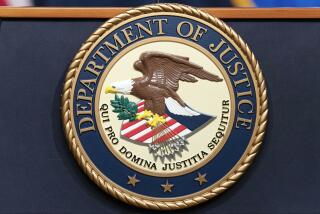Evidence mounts that Pakistani major spoke to Times Square suspect
- Share via
Reporting from Islamabad, Pakistan, and Washington — Pakistani and U.S. investigators cited growing evidence Saturday that a Pakistani army major had been in cellphone contact with a man who allegedly attempted to bomb Times Square in New York, including the possibility that they spoke shortly before the failed bombing.
U.S. officials said they were aware of cellphone traffic between Faisal Shahzad and the unidentified Pakistani military officer, bolstering reports days earlier from Pakistani law enforcement sources.
A Pakistani law enforcement source added detail Saturday, saying the major had cellphone contact with Shahzad on May 1, the day of the botched bombing, including a conversation that occurred as the Pakistani American was allegedly parking his SUV rigged with propane tanks, fertilizer and fireworks.
Investigators are keenly interested in the major’s role in the bombing attempt because he had more than one cellphone conversation with Shahzad from the time the suspect allegedly loaded his Nissan Pathfinder with bomb components to the moment he parked the vehicle and walked away, said the Pakistani source, who spoke on condition of anonymity because he was not authorized to speak about the investigation.
U.S. officials said they could not confirm that timing of the conversations between Shahzad and the major. U.S. investigators have limited information about the major, who is in custody in Pakistan, and are negotiating with the Pakistani government to interrogate him, they said.
The Pakistani source said the sequence of phone calls suggests that the major was aware of the plan that Shahzad is accused of trying to carry out — detonating a bomb in one of New York’s prime tourist magnets — though investigators are still trying to determine the major’s exact role.
Investigators know of at least one meeting between the major and Shahzad in Pakistan’s capital, Islamabad, sometime in 2009, the Pakistani source said. Authorities have previously said they believed that Shahzad arrived in Pakistan from the U.S. last summer and later went to Pakistan’s tribal areas, where he got training in bomb-making at a Taliban camp.
The bomb was poorly constructed and had little chance of causing a large number of deaths, suggesting that its maker was unable to follow through with whatever training he did receive.
Although Pakistani authorities have been cooperating with U.S. investigators in ferreting out Pakistanis linked to Shahzad, they have tried to downplay any ties he might have to the Taliban, instead portraying him as a lone wolf.
Three weeks into the investigation, however, there appears to be little doubt of the Pakistani Taliban’s strong link to Shahzad and the bombing attempt.
Pakistani law enforcement sources have said that, while Shahzad was in Pakistan last summer, he met with a Taliban facilitator at least three times. At one of those meetings, the Taliban member provided an undisclosed sum of money because Shahzad had said he was running out of cash. U.S. officials familiar with the case have said that the Taliban gave Shahzad about $15,000 to finance the attack.
A Taliban member who said he was familiar with Shahzad’s travels in Pakistan’s tribal areas last year said Taliban facilitators transported Shahzad from the northwestern city of Peshawar into the Mohmand region in the tribal belt along the border with Afghanistan.
There, he said, Shahzad was taken to Omar Khalid, the Pakistani Taliban’s leader in Mohmand, before getting five days of training at a Taliban camp near the village of Baizai, near the border.
It remains unclear whether the major had any connection with the Taliban. However, his role in the case could become an embarrassment for the Pakistani military, which regards the Taliban as a formidable threat to the country and has launched large-scale offensives against the militant group in the country’s restive Swat Valley and in several tribal belt regions, including South Waziristan, Bajaur and Orakzai.
The army has denied that any officer has been arrested in connection with the Shahzad case and said that the major in question was arrested for disciplinary reasons. It also described him as a retired army major. However, the law enforcement source said the major was in the army at the time of his arrest.
The major is one of at least 13 people who have been arrested or detained in Pakistan in connection with the Shahzad case. Pakistani authorities have also arrested Salman Ashraf Khan, the co-owner of a catering company that serves embassies and large companies.
It is unclear how Khan might be tied to the Times Square bombing attempt. On Friday, the U.S. Embassy issued a warning about the catering company, Hanif Rajput Catering Service, saying that it had links to terrorist groups.
Staff writer David S. Cloud in Washington and a special correspondent in Pakistan contributed to this report.
More to Read
Sign up for Essential California
The most important California stories and recommendations in your inbox every morning.
You may occasionally receive promotional content from the Los Angeles Times.











